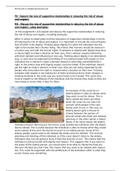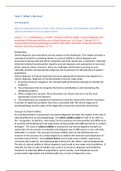Essay
P6 M3 Unit 11- explain the role of supportive relationships in reducing the risk of abuse and neglect, discuss the role of supportive relationships in reducing the risk of abuse - Health and Social Care - Extended Diploma
- Vak
- Instelling
This piece of work is to help with the P6 and M3 for Unit 11 Health and Social Care - My teacher has signed this assignment off which means that it does meet the grading criteria. Hope it helps, all the best. Please take note that this document cannot be copied and I would appreciate if you res...
[Meer zien]




